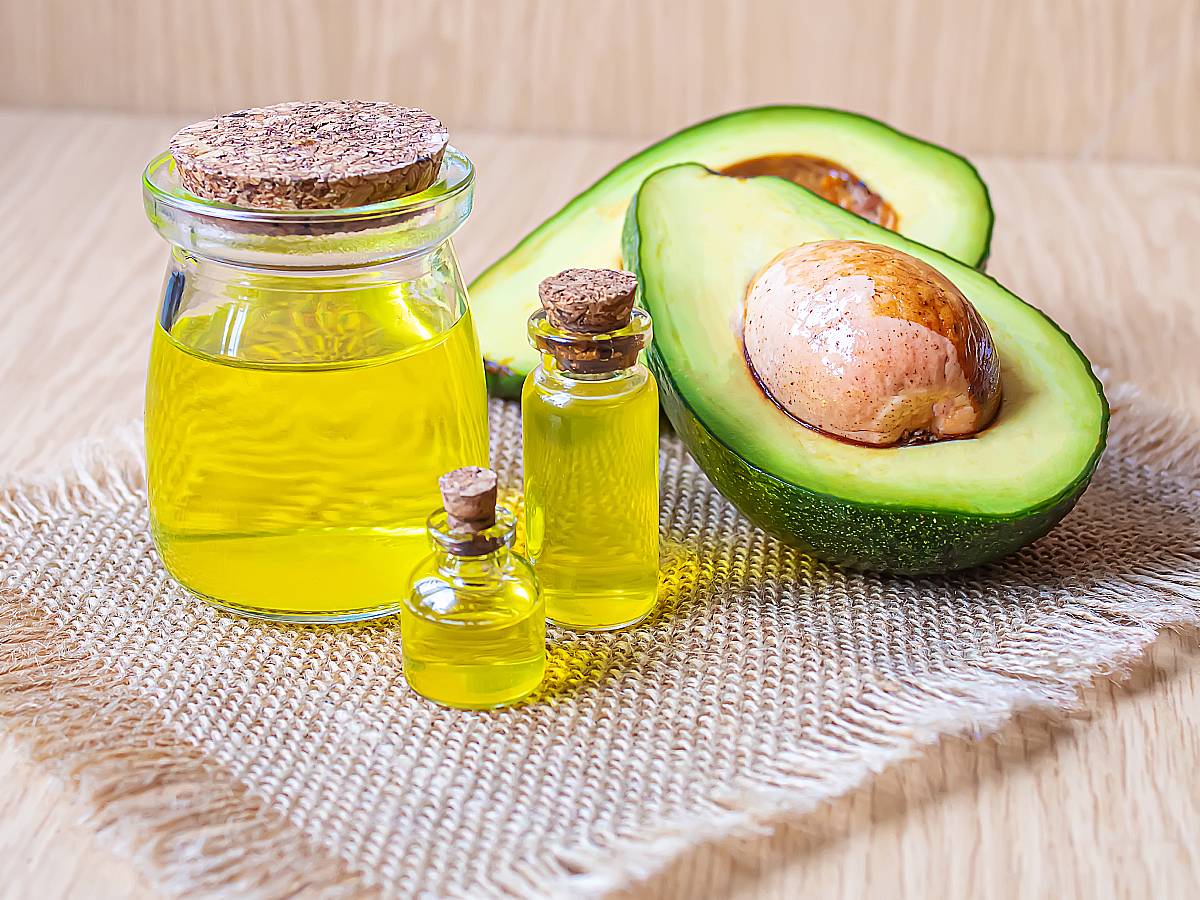Avocado oil is so much more than a healthy choice for preparing meals. It’s also a great beauty product, proven to moisturize and nourish your hair and scalp.
Even better, it does so in a manner that’s gentle and non-abrasive. It also absorbs completely into both your hair cuticle and pores. Unlike many oils, it doesn’t leave an unsightly, greasy mess.
I asked Camille Hebert, hair designer at Re.Growth Holistic Salon in Queen Creek, AZ, for her take. “All oils have different aspects to them… Your hair’s needs would determine what type of oil to use. I believe avocado oil is starting to catch on more now and is beneficial in adding moisture and environmental protection. It absorbs easily into the skin and hair if used sparingly.”
However, avocado oil for hair may be a new concept to you. That’s why I put together this ultimate 101 guide to avocado oil for hair. As you read, you’ll learn:
- What avocado oil is. Avocado oil is pressed from avocados, just like you find in the produce section.
- Why avocado oil is good for your hair and scalp. From fighting dandruff to reconstructing your hair, avocado oil offers quite a few benefits.
- How, where, and when to use avocado oil. You can add avocado oil to your shampoo, conditioner, and so much more.
- Who can benefit the most from avocado oil. Certain hair types will reap bigger benefits, while others may want to use avocado oil rarely. I’ll break it all down for you.
- Mixing and buying advice for avocado oil. My favorite oils to mix, and my best tricks for buying pure avocado oil.
- FAQs on avocado oil. Still got a few questions? Don’t worry– I’ve got answers.
What is Avocado Oil?
Avocado oil is formulated from avocado fruits. It’s a popular cooking oil due to its high smoking point and mild taste. Across the board, it can be used for a variety of health and beauty utilities.
As a matter of fact, cold pressed avocado oil is similar to extra virgin olive oil. It’s unrefined, retains its color and scent, and its beneficial properties. (source).
Unfortunately, many hair and skin products that contain avocado oil use refined varieties. The unrefined type provides you with far more restorative value.
Avocado oil can be produced in several different ways. The most common way is to pick ripe avocado fruits at their peak of freshness, wash each by hand, then skin and de-pitt them.
Only the pulp is necessary for processing, unlike other oils which usually come from the seeds of a fruit.
The avocados are then pushed through the press. This creates the same creamy consistency needed to make guacamole. A centrifuge process removes the oil from the pulp. Basically, a quick-spinning drum forces out both the oil and excess water. Since the oil isn’t as dense as water, it gathers on top of the water and seeps from perfectly-placed holes in the drum.
Benefits of Using Pure Avocado Oil for Hair
- Promotes Hair Growth – Since avocado oil contains vitamin D, it stimulates hair follicles and the surrounding blood vessels. It also unclogs blocked follicles when it’s massaged into your scalp. This can prevent hair loss over time.
- Boosts Smoothness and Shine – Avocado oil imparts shine. That’s because the wealth of minerals found in the oil, such as potassium and magnesium. They seal your hair’s cuticle, making hair look shiny and smooth.
- Improves Scalp Health and Fights Flakes – Avocado oil hydrates your scalp, eliminating flaking and dandruff due to weather. I’ll teach you how to do an avocado oil scalp treatment later on.
- Strengthens and Nourishes Hair – Avocado oil is rich in a variety of minerals, essential fatty acids, and antioxidants. It’s also jam-packed with vitamins like biotin, vitamin A, vitamin B-5, and vitamin E. These nutrients strengthen each hair strand. This is especially true of vitamins E and B-5, which strengthen, moisturize, and repair by sealing your cuticle.
- Moisturizes and Conditions from the Inside Out – Since avocado oil is quite rich in monounsaturated fats and oleic acid, it’s one of very few oils that can fully penetrate hair. It moisturizes hair from the inside out, rather than simply sitting on top of it.
- Repairs Damage and Reconstructs Hair – While avocado oil use is unlikely to fix severe hair damage, it does prevent further splitting and breaking by lubricating dry and brittle strands. Coating hair with a layer of avocado oil can also protect it from damage caused by brushing or styling.
- Fights Frizz and Tangles – You can easily detangle long hair by applying a bit of avocado oil to the ends and using a wide-toothed comb on any knots before brushing your hair as usual.
- Enhances Natural Curls – Since avocado oil is lightweight, it provides the perfect amount of moisture to naturally curly hair, which tends to be dry by nature. It also discourages frizz by conditioning each curl inside and out, adding shine and vitality.
Potential Risks and Drawbacks
Avocado oil for hair is overall safe to use. However, if you’re allergic to avocados in general, it may be wise to check with your doctor before applying. After all, you may still experience side effects even with topical use.
If you’re unsure of your tolerance for avocado oil, first conduct a patch test on an isolated part of your arm to check for allergies or reactions. While avocado allergies aren’t very common in the general population, they can happen. They are especially prevalent among those that are also allergic to latex.
How to Use Avocado Oil for Hair
Avocado Oil Hair Mask
You can easily create a quick and beneficial avocado oil hair mask in your own kitchen. It’s simple!
When: Once a month if you have fine hair. Up to twice a month if you have dry, frizzy hair.
Where: To all of your hair, but skip your scalp.
How: 1. Gather one whole avocado, one banana, one tablespoon of coconut oil, one tablespoon of avocado oil, and one tablespoon of honey.
- Mix the avocado (sans pit) and banana in a blender to prevent it from becoming too lumpy.
- Add in both oils and the honey, folding them in with a spoon.
- Apply the paste to the entirety of your hair and allow it to set for 20 minutes or more until it starts to set. (For best results, leave the mask on for at least an hour).
- Rinse the hair mask off with warm water. You can also use a gentle shampoo if the water isn’t completely effective.
Shampoo and Conditioner
You can use avocado oil in conjunction with your shampoo or as a conditioner replacement.
Shampoo Helper
When: No more than once a week. Start with once a month and increase the frequency if needed.
Where: To your scalp and roots. Shampoo isn’t formulated to benefit your mid-shafts or ends.
How: 1. Massage avocado oil onto the scalp. Pay extra attention to areas affected by dry skin, flakes, and irritation.
- Leave the oil in for up to an hour to penetrate the scalp and protect it during hair washing.
- Shampoo as usual.
Conditioner Alternative
When: Start with twice a month if you have fine hair. For coarse, dry, or frizzy hair, start with once a week. The most often you’d want to do this is every other wash, and only if you’re seeing benefits.
Where: To your mid-shafts and ends. Avoid your scalp and roots unless your roots are damaged or heavily processed.
How: 1. Wash your hair as you normally would.
- Take a few drops of avocado oil in your hands and use your fingers to distribute along your mid-shafts and ends.
- Repeat this process as many times as necessary to coat your hair, staying away from your roots and scalp.
- After about 5 minutes, rinse the avocado oil from your hair.
Leave-in Conditioner
This works best if you have a thick, dry, or curly mane. It’s great for preventing hair breakage.
When: Start with once a week and dial it in from there. You may be able to do this treatment after every wash if your hair is particularly thick.
Where: Focus your application on your ends and slowly work up to your mid-shafts. Use very sparingly, if at all, on your roots.
How: 1. Take a nickel-sized amount of avocado oil and distribute it evenly throughout towel-dried hair.
- Blow dry your hair or allow it to air dry.
- Though this is optional, you can add a similar amount of avocado oil to your hair, once again, after it’s dry.
- Once the oil has dried, you can style your hair as usual.
Styling Product
You can easily use avocado oil as an alternative to chemical-laden styling serum. It’s also much more reasonably priced. You can also check out our favorite hair products.
When: Anytime your hair feels dry, straw-like, or unmanageable. Use a very small amount on dry hair. You can use a little more on damp hair.
Where: To unruly sections of your hair. Your roots will likely need much less than your ends.
How: 1. Take the avocado oil into your palm and use your fingertips to lightly apply the product from the middle of each hair shaft towards your ends.
- Brush your hair with a natural boar brush to distribute the serum evenly.
Avocado Oil Scalp Treatment
Moisturizing your scalp and the base of your hair follicles with avocado oil can alleviate the symptoms of a flaky and dry scalp, preventing further dandruff.
When: Start with once a month. You can increase up to twice a month if needed. Don’t be afraid to adjust the frequency as the seasons change– the climate has a huge effect on your scalp.
Where: To your scalp only.
How: 1. Take a bit of avocado oil and place it in a bowl.
- Warm the oil in the microwave for a few seconds.
- Separate your hair into sections. I usually part my hair down the middle from my front hairline to my nape, splitting my hair in half. Then I separate the front on both sides for a total of 4 sections.
- Apply the avocado oil to your scalp and massage it with a cotton ball or your fingertips, paying special attention to flaky or itchy skin.
Hair Type Considerations
I asked Camille if everyone can benefit from using avocado oil for hair. She told me, “Avocado oil can benefit all hair types as long as you don’t have an allergy or sensitivity.
You should always do a patch test if you’re not sure. Depending on hair texture and scalp health you would use the oil in different ways, but everyone can benefit from oil use.”
Thick, Coarse, Curly, or Heavily Processed Hair

Avocado oil works wonders as a leave-in conditioner for thick, coarse, curly, and processed hair. It prevents both frizz and breakage. If you fall into this category, you can use avocado oil to keep your hair manageable.
Since it contains vitamin D, it works especially well to replenish ethnic and African-American hair. Having skin rich in melanin can prevent the natural absorption of Vitamin D from the sun.
Treatments like hair masks restore vitamin D, boost shine, and add moisture to natural hair as part of a regular hair care routine.
Oily or Fine Hair

Scalp applications of avocado oil can be especially beneficial if you have fine or thinning hair or hair loss. This is because the consistent application of biotin, which is prevalent in avocado oil, stimulates hair follicles and encourages healthy hair growth.
And since those with thin hair have to worry more about oily scalps, using avocado oil over other oils is advantageous. It’s light and absorbs easily, leaving you without that greasy feeling.
Color Treated or Medium Density Hair

Again, since avocado oil seeps into each individual strand, it conditions dry hair deeply without heavy buildup. It doesn’t weigh hair down since it’s lighter than other oils.
That is why it’s the perfect conditioner choice for medium-density hair or if your hair is medium to low in porosity (such as color-treated hair). As a matter of fact, using avocado oil to moisturize your hair can seal in color and protect it from fading.
Best Oils to Mix with Avocado Oil
Avocado oil is known in herbology as a carrier oil, but what does that mean exactly? Well, carrier oils are base oils used to dilute far stronger essential oils. They help to diffuse oils so they can be used to treat hair and skin more effectively.
Avocado oil works quite well as a carrier oil since it has little to no scent. That means it works well as an addition to many essential oils and blends without blatantly taking over. Here are just a few of the hair-nourishing essential oils that can work hand-in-hand with avocado oil to benefit your hair and scalp:
Peppermint Oil
Peppermint oil can help balance pH levels, regulate oil production, increase the fullness of hair, promote hair follicle growth, and calm scalp inflammation. (source).
You can dilute peppermint oil effectively with avocado oil by adding three drops of the former to every two teaspoons of the latter. Then, simply take the mixture and rub it intensely onto your scalp.
Let it sit in your hair, actively working for at least a half an hour, and then shampoo and condition your hair. This treatment will increase blood circulation, activating hair follicles and producing healthy hair.
Lavender Oil
Lavender oil also has antimicrobial properties, which discourage the growth of fungi and bacteria on the scalp. This is helpful for those with sensitive scalps, who often suffer from dandruff and itchiness.
The oil also increases circulation to hair follicles, promoting quicker growth and thicker shafts. It also moisturizes hair until it feels silky, and it has a luxurious, floral scent that can be very relaxing (source).
You can dilute lavender oil with avocado oil by mixing them with equal parts of each other. Rub the mixture onto your scalp and drape each strand generously. Rinse the oils out with warm water after half an hour. This works best on thicker hair.
Coconut Oil
Coconut oil works as an in-depth hydrator for both hair and skin, strengthening dry, damaged, and frizzy hair, as well as irritated scalp skin. It does this by employing both vitamin E and a mix of omega-3 fatty acids to prevent hair damage (source).
When diluting coconut oil with avocado oil, simply mix equal parts of each. A quick treatment involves warming two tablespoons of each in the microwave in a mug, and then combing the mix through dry hair. Since it can get messy, try sectioning the hair first and applying the oil mixture to each part one at a time. Wait about ten minutes for it to sink in and then rinse it out with hot water.
Advice on Buying Avocado Oil for Hair
Like any other beauty or health product, it’s always best to research your avocado oil before you purchase it. You should know what you are getting ahead of time by observing the following aspects of the oil:
Color – Pure avocado oil should always be green in shade, and anything labeled as avocado oil that is light yellow to clear indicates that it was refined. As part of that process, pigments are removed.
Of course, over time, fruits ripen and your avocado oil may lose chlorophyll while it’s in storage. This all depends on the temperature, oxygen levels, and light that was available. So, sometimes pure avocado oil may turn gold from an original emerald green hue.
Scent – Refined avocado oil is nearly odorless, but pure avocado has scents that range from nutty to sweet to buttery. Some folks even report a slight mushroom aroma.
Extraction Method and Purpose – Usually it’s only cold-pressed, unrefined avocado oil that is used for cosmetic applications. If you suspect that your oil has been processed or refined, it probably is being marketed more for use in cooking.
Price – Pure avocado oil should not be expensive if it has not been processed. However, if it’s too cheap, this could also be a cause for concern. You want to be sure that all involved in the agriculture and harvesting of the avocados were fairly compensated.
Sourcing – Again, you want to be certain that the avocado oil that you buy is not only sustainably sourced, but also grown and processed in a cruelty-free environment. After all, products that you buy should be sold by companies which align with your social and ecological values.
I asked Camille for her thoughts on the importance of sustainability. She told me, “Sustainable oil sources are important to shop for. With it being a product from nature, the way we grow, farm, package, and distribute these products affects the quality and overall availability of these resources.
We don’t want to deplete our natural resources for the future, and it’s important to look at how we can sustain the use in an industry that unfortunately creates more waste for the landfills.”
You should seek out products from organic growers that refrain from using synthetic fertilizers and pesticides on their avocado crops. It’s healthier for you as a consumer, and it also preserves the land and water of the area surrounding the farm.
As responsibly-sourced avocado oils, NOW Solutions Pure Avocado Oil, and Majestic Pure Avocado Oil for Hair and Skin, are both products that are pure, unrefined, safe, and healthy. They’re made to provide your hair and scalp with all the advantages of a wide variety of vitamins and minerals. They’re some of the best avocado oil products on the market.
FAQ Section
Can avocado oil stimulate hair growth?
Avocado oil can help to stimulate hair growth by unclogging hair follicles that may be hindered from producing healthy hair shafts. It can also nourish the scalp and therefore encourage new hair follicles to form, leading to further hair growth.
Is avocado or coconut oil better for my hair?
Both coconut oil and avocado oil are fantastic for hair when it comes to moisturizing and conditioning dry hair shafts and scalps. That said, avocado oil is much better because it has many more uses and applications than coconut oil when it comes to maintaining healthy hair and scalp skin.
Can I leave avocado oil in my hair overnight?
It depends on how you use the avocado oil for your hair care. Those that are using it for the purpose of a leave-in conditioner may leave it in for days. This is also dependent on your hair texture.
Can I use expired avocado oil on my hair?
Using expired avocado oil on your hair is certainly not recommended. It will lose the potency of its various vitamins and minerals once it expires and therefore its hair oil benefits will be limited.
How often should I use avocado oil on my hair?
The answer to this question all depends on what you are using the avocado oil for. The treatment you are using, your specific type of hair, and the reason why you are using the oil all factor into how often you should use it.
Which avocado oil is best for hair?
Unrefined, pure avocado oil is always the best choice for the many functions that the product provides for hair. Refined avocado oil loses the basic essence of what allows the product to be healthy and nourishing in the first place.
